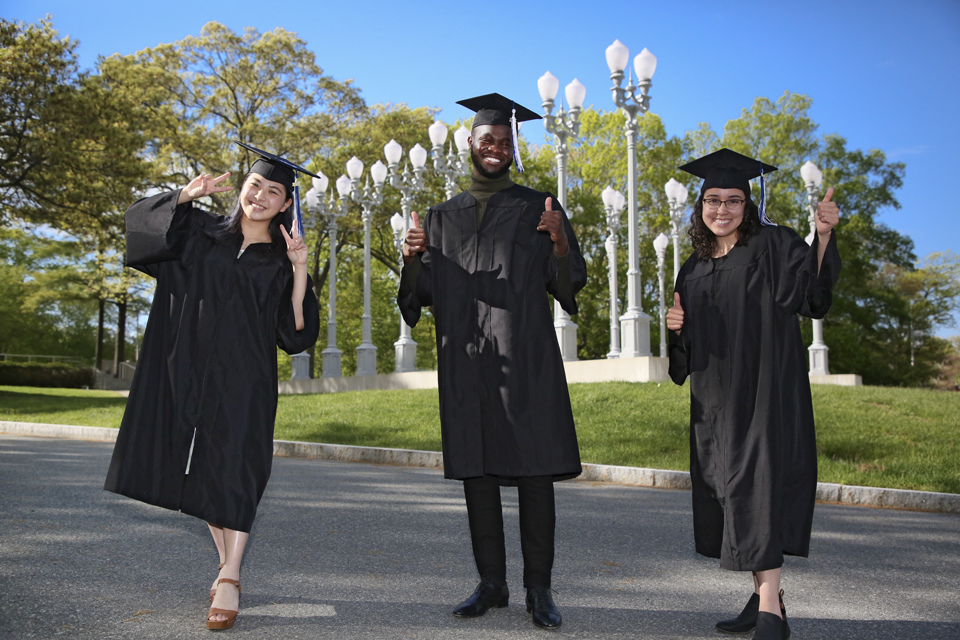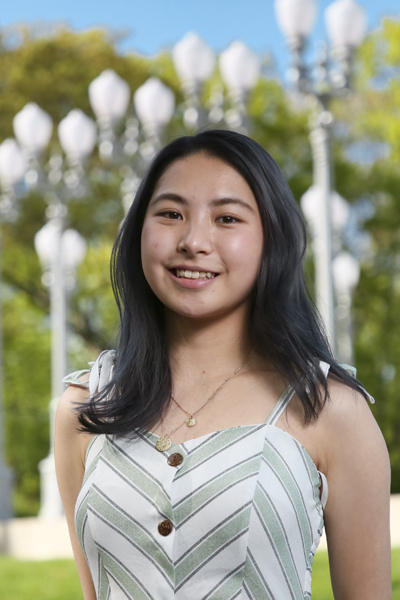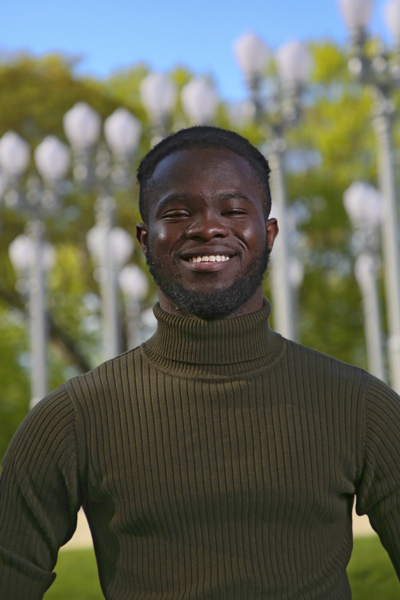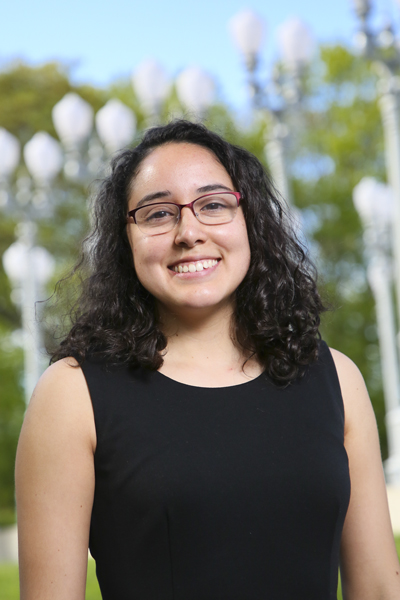The long road to Commencement for Class of 2021 international scholars
Hundreds of seniors in the Class of 2021 are international scholars that haven't been home since before the COVID-19 pandemic started.
 Photo/Mike Lovett
Photo/Mike LovettPanny Tao '21, Akwasi Owusu-Brempong '21 and Nicole Berenice Zamora Flores '21
When Panny Tao ’21 waved goodbye to her parents and three-year-old brother, Yanlin, at the Changsha airport in January 2020, she never would have imagined how long she would wait to be with them again.
Tao, an International and Global Studies and East Asian Studies double-major from Hunan Province in China, tried to console a crying Yanlin, who didn’t fully understand why his older sister had her bags packed to leave.
“‘I’ll be back soon! Don’t cry!’ I told him,” she recalled.
Tao is part of a special community within this year’s graduating class: The hundreds of international students who have not returned to their home countries or seen their families since COVID-19 became a global pandemic.
These students’ stories of their time in a different country during COVID-19 paint a picture of adversity, character and resolve in the face of uncertainty and stress. Completing their Brandeis undergraduate degrees is an extraordinary accomplishment when you consider the other challenges they have faced the last 15 months: Loneliness and homesickness, personal struggles with a nationwide reckoning on racism, sorting out immigration status and housing, and worries about health and safety.
For many of them, including Tao, they can now start to look forward to seeing their families again.
“I have since missed my brother’s fourth birthday, and I will also now miss his fifth birthday,” Tao said. “A few weeks ago, he drew a family picture, and I wasn’t in it. That hurt me. I miss all my family so much and feel such an imperative to return.”

Panny Tao '21
‘You’re overreacting’
Few people around the world suspected COVID-19 would develop into a pandemic when it arrived on the scene in Wuhan, China in December 2019, though Tao, who frequently communicates with her family using WeChat and habitually reads Chinese news, had a sinking feeling soon after her junior year spring semester started.
With the virus showing no signs of slowing down in her home country and a worldwide spread imminent, Tao went online to purchase personal protective equipment in bulk: three boxes of N-95 surgical masks and four hazmat suits.
Mask-wearing, even prior to the pandemic, is commonplace in Tao’s culture to prevent the spread or contraction of illness, and she felt it was important to take precautions. At the time, Tao felt her stress growing and wanted to keep one box for herself and her American suitemates at Brandeis and ship two boxes to China for her family, who live a few hours from Wuhan by car.
A combination of China putting strict restrictions on its border and high shipping costs ultimately caused Tao to abandon her plan.
“It was pretty scary, they are quite close to Wuhan and I had been up late every night learning the latest about the disease,” Tao said. “I wanted to help.”
Meanwhile, Tao’s suitemates likened her to a doomsday-prepper.
“I tried to tell my American roommates what was going on in China and that I wasn’t sure what would happen here, but they refused to believe me,” Tao said. “They said, ‘you’re overreacting, it’s not going to come here, and even if it does come here, our medical system is good.’”

Akwasi Owusu-Brempong ‘21
‘I just didn’t know what would happen next’
A few weeks later, places of work, worship centers, restaurants, museums, and public spaces around the U.S. went into lockdown. Masks flew off store shelves or went up exponentially in price online.
Airline tickets soared, too – Tao said a typical off-peak rate from Boston to Shanghai went from $600 to $4,000 one-way.
Brandeis switched to remote learning for the remainder of the 2020 spring semester, though Tao and her peers from abroad that chose not to return home or were unable to leave the U.S. also had to determine their immigration status and find lodging in the summer.
Akwasi Owusu-Brempong ’21, a Business and Economics double-major from Accra, Ghana, said he faced a great deal of uncertainty at the time.
“I just didn’t know what would happen next,” Owusu-Brempong said. “We all had a hard time. But for international students there was that extra layer of not knowing whether we were going home or staying or had authorization to even be in the U.S.”
Owusu-Brempong, who last returned to Ghana in January 2020, has family, including an aunt, in the Boston area, which made the last year easier.
Nicole Berenice Zamora Flores ’21, a Computer Science and Business double-major from Quito, Ecuador, also missed her close-knit family back home.
“I wondered, what would happen to me here?” said Zamora Flores, who stayed with one of her Brandeis friends for a few weeks before moving in with her cousin before the fall 2020 semester began. “I felt afraid about being able to see my family again.”

Nicole Berenice Zamora Flores ‘21
‘Moment to moment’
In the early days of the pandemic, Brandeis switched to full remote learning, developed guidelines for hosting virtual academic and social events, and began planning the testing, contact tracing, and quarantining protocols the campus would need for in-person activity to resume in the summer and fall.
The university also started the Student Emergency Fund for undergraduates and graduates in need of assistance with lodging, travel, food, and other critical needs like medical care, visa applications, and laptops. The Department of Community Living accommodated students who were unable to go home and used the Student Emergency Fund to support on-campus room and board for those unable to afford it.
Since July 1, the fund has provided $1.1 million in assistance to 619 students, with 42% going to students from countries outside the U.S.
Students also had to navigate immigration laws when weighing their options for staying in the U.S., and one factor that proved particularly challenging is the F-1 visa’s requirement for international scholars to be enrolled in no more than one virtual course each semester during their time in the country.
With Brandeis and most other institutions switching to remote learning, nearly all international students were overstepping the visa’s rules during spring 2020. As a result, the university signed onto three separate amicus briefs in federal court centered on accommodating international students here on visas, and Brandeis President Ron Liebowitz sent a letter advocating for scholars from abroad to the Secretary of Homeland Security.
Brandeis International Students and Scholars Office (ISSO) director Jodi Hanelt shifted her team’s services during lockdown by designating windows for students to meet with advisors over Zoom rather than in-person, including after hours and on weekends.
“We wanted our international community to feel heard, and that even if we couldn’t fix a visa or a housing challenge, we were at least able to tell them in real-time that we were working on it,” Hanelt said. “They had a lot of stressors in the background which were well-founded because they were basically living moment to moment whenever the federal government issued new guidance.”
‘It’s a time of reflection’
As Zamora Flores approaches the date of her graduation, she finds herself often thinking about the journey she’s been on in the last four years.
“It’s a time of reflection,” she said. “One thing I’ve realized is how fragile our lives are, and what the important things in life are. If you don’t have health, you can’t do anything, so this disease really highlighted inequality for me – not that I was unaware before – but it made me more aware.”
Prior to coming to Brandeis, she had never been outside of Ecuador, and marveled at the diversity of culture, language, religion and identity that she saw on campus.
Her education at Brandeis has featured some unexpected twists. She discovered an interest in computer science her junior year even though at one point she had considered dropping classes on the subject. She found a passion for the intersection of arts, social justice and social issues, and declared her minor in Creativity, Arts and Social Transformation (CAST). Now, Zamora Flores is looking forward to starting her career as a software engineer at Athenahealth.
Owusu-Brempong, who has accepted a job offer to work as a consultant for AlixPartners in Boston, said he is reflecting on his time at Brandeis, too.
A midfielder on the Brandeis Soccer Club, Owusu-Brempong said his friends and teammates played a role in settling him into life as an American university student, as did his Wien International Scholar peers, various clubs and organizations he joined, and even a class he took on Salsa dancing. Those experiences are what he’ll remember most about Brandeis.
“I came here and didn’t just stay in my room and focus all on grades, I was able to have loads of experiences and I’m glad for that,” Owusu-Brempong said. “I think this journey shows a lot of resilience and perseverance, because despite a lot of the things that have happened through four years, I’ve been able to stay focused and have had a very holistic time here – learning new things is why I came here.”
Tao said the stress of the last year has been overwhelming at times. She experienced racism as an Asian for the first time in her life, and, combined with the nationwide protests against the police killings of Black, Brown, and Hispanic people, sought a deeper understanding of societal problems related to racism and equality.
“I’ve learned a lot in the last year,” Tao said. “Mentally, I am so much stronger, not only in terms of caring for myself but also understanding other people’s struggles.”
With Commencement in sight, Tao is looking forward to receiving her diploma with hope and pride. She’s also finally making plans to at last see her family.
“It’s been a long journey,” Tao said. “And I have a lot of stories to tell.”
Categories: General, International Affairs, Student Life





